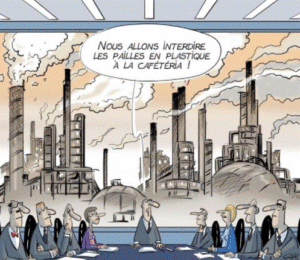I am thoroughly fed up with the blah-blah-blah!
Dear friends,
Dear colleagues,
Every week, the Buddhist monk, humanitarian, author and photographer, Matthieu Ricard, sends me an e-mail. I loved the message he wrote me on December 4th this year. It was a crucial source of inspiration for the short communication you are about to read. I have added some personal comments and references.
In announcing the final COP 26 communiqué (October 31, 2021 – November 12, 2021), its president, Alok Sharma, could hardly contain his tears when he paused to say I’m really sorry and apologize to you [Singh 2021]. The assembly stood up to applaud his desperate efforts, along with those of so many others, to convince the planet’s major polluters to moderate the damage they are inflicting on our environment and the suffering they are imposing on current and future generations. The polluters, however, have remained largely deaf to the cries of those who are already suffering from environmental upheavals. Nothing but talk; nothing but blah-blah-blah! How can people not be concerned about the fate of their children, grandchildren and those who will follow them? What will we say to them when they realise that we knew what was happening and did not do anything to change the course of events?
The continuous haggling and procrastinating of the most polluting countries is simply unbelievable. Would you negociate with the surgeon to remove only half the tumor that is threatening your health and quality of life? Wouldn’t you mind if the fire brigade came in a week’s time if your house was on fire now?
An advisor of the Saudi Ministry of Oil asked that phrases such as … the need for urgent and accelerated mitigation actions at all scales… be removed from the report. A senior Australian government official rejected the conclusion that the closure of coal-fired power plants is necessary, while the end of coal use is one of the stated objectives of COP 26. India announced it was aiming to achieve carbon neutrality in … 2070 (my grandchildren will then have grandchildren of their own). In other words: never! In the meantime many irreversible upheavals will have occurred. Coal is responsible for approximately 40 % of annual carbon dioxide emissions, making the reduction of its use a priority to meet the 1.5 °C target. Global emissions must be reduced by 45 % by 2030 and be virtually zero by the middle of the century (some 20 years earlier than 2070). The draft report also stated that plant-based diets can reduce greenhouse gas emissions by up to 50 % compared to the average emissions-intensive Western diet, as already evidenced in the scientific literature [Willett et al. 2019; Vaidyanathan 2021]. Brazil and Argentina, two of the world’s largest producers of beef and feed products, strongly opposed the inclusion in the final report of any evidence that shows that reduced meat consumption is necessary to reduce greenhouse gas emissions.
Is it not absurd that the largest delegation at the COP 26 was that of the fossil fuel industry lobbyists? According to the Global Witness analysis shared with BBC Radio, there were more delegates at the COP 26 associated with the fossil fuel industry than from any major country: 503 people with fossil fuel interests were accredited to participate in the climate summit!
According to the United Nations Development Programme, governments around the world spend more than $420 billion each year to subsidise non-renewable energy, despite G7 commitments to phase out “inefficient” fossil fuel subsidies by 2025 (in less than 4 years from now). By comparison, world governments are struggling to provide a mere $100 billion to help poor countries develop renewable energy. Fossil fuel subsidies are measures taken by governments to artificially lower the price of non-renewable coal, oil or natural gas.
According to Rockström [2021], it is still possible to stabilize at 1.5 °C warming. However, immediate and radical global action is needed to avoid the risk of tipping points, including major forest systems and the Greenland ice cap. The rapid growth of methane and nitrous oxide emissions puts us on the path to a 2.7 °C warming, and climate tipping factors pose high-impact risks. Peak temperatures at 50 degrees during summer will be the rule, not the exception. Goodbye to sunbathing, goodbye to winter sports! You object to migrants? You will have to get used to them, whether you like it or not, because nobody can arrest people who are starving. In 2050 as many as 200 million environmental migrants could well be moving to regions that are still temperate today; that is a hundred times more than the few million migrants who have already arrived in Europe.
This requires a set of immediate, short-term binding targets, which governments must reach during their term in office [Monti et al. 2021; Wang et al. 2021], rather than passing the buck to the next government and putting off unpopular measures. The costs of climate change mitigation are huge, but they are justified by the multiple benefits to human and natural health. They pale into insignificance when compared with the economic, human and environmental costs of on-going degradation. The future has not yet started to hurt,but when it does it will be very painful!
Please, stop this misplaced malevolence!
Our future belongs to those who show a positive attitude, to those who favour cooperation [Nowak 2011], and real progress is needed to stop the tipping points before it is too late. We have at best seven or eight years to sort out our energy priorities. We had better stop all the blah-blah-blah right now.
References
Monti et al. [2021]. A new strategy for health and sustainable development in the light of the COVID-19 pandemic, The Lancet 398, 10305, 1029 – 1031
Nowak [2011]. SuperCooperators: Beyond The Survival of the Fittest: Why Cooperation, not Competition, is the Key to Life, Canongate, pp. 330
Rockström et al. [2021]. We need biosphere stewardship that protects carbon sinks and builds resilience, Proceedings of the National Academy of Sciences 118, 38, pp. 5
Singh [2021]. ‘No drama’ Alok Sharma’s tears will have only enhanced his personal reputation after COP26, available on https://inews.co.uk/news/politics/no-drama-alok-sharmas-tears-enhanced-personal-reputation-cop26-1300112
Vaidyanathan [2021]. Healthy diets for people and the planet, Nature 600, 22 – 25
Wang et al. [2021]. We need a global science-policy body on chemicals and waste, Science 371, 6531, 774 – 776
Willett et al. [2019]. Food in the Anthropocene: the EAT–Lancet Commission on healthy diets from sustainable food systems, The Lancet 393, 447 – 492

